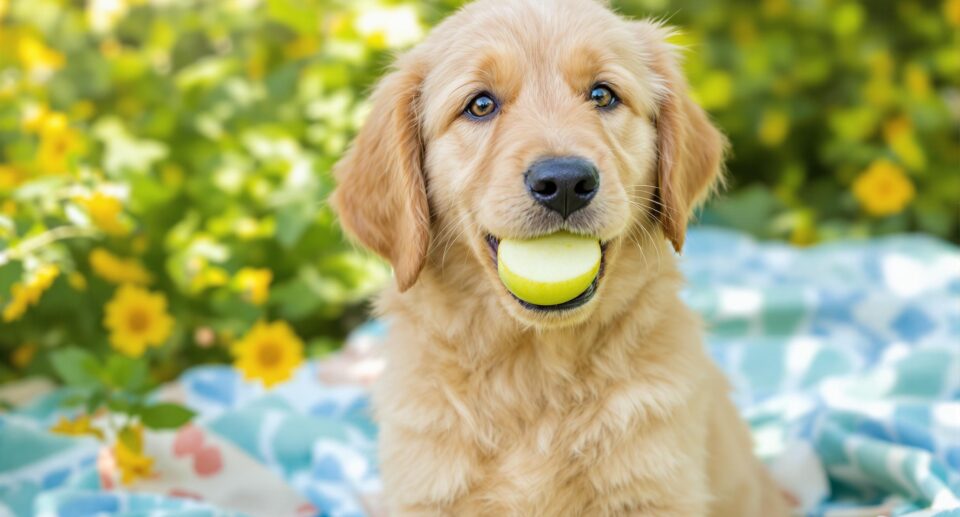Can Dogs Eat Apples? Everything You Need to Know

Key Takeaways
- Apples can be a healthy treat for dogs when served in moderation, offering vitamins A and C, fiber, and antioxidants that promote overall wellness.
- Safety is crucial: remove seeds and core to avoid choking hazards and potential cyanide toxicity from seeds.
- Introduce apples slowly to detect any allergic reactions or digestive issues, and keep treats to 10 percent of your dog’s daily food intake.
That familiar moment when you bite into a fresh, crisp apple and your dog gazes up with those hopeful eyes is hard to resist. It is natural to want to share a healthy snack with your furry companion. The good news is that apples can be a wonderful treat for dogs when served with care.
PetHealthMD helps you understand how to offer fruits like apples safely, so you can make informed choices with your veterinarian. A whole apple contains about 19 grams of sugar, so moderation matters. With the right preparation and portion control, these crunchy bites can support both nutrition and dental health, making them a safe and enjoyable way to reward your dog.
Nutritional Benefits of Apples for Dogs
The benefits of apples for dogs go beyond being a simple treat. They offer valuable nutrition that supports your furry friend’s overall well-being. These fresh fruits provide a satisfying crunch while delivering nutrients that help keep your dog healthy and active. When incorporated thoughtfully into your dog’s treat rotation, apples become a nourishing addition to their diet.
Here is what apples can provide:
Immune system support: Apples are rich in vitamin A and vitamin C. These essential nutrients strengthen your dog’s immune system and act as powerful antioxidants, helping protect cells from damage.
Healthy vision and skin: The vitamins in apples also support healthy vision and skin, contributing to your dog’s natural defenses and helping maintain their vibrant health as part of a balanced nutrition plan.
Digestive health and weight management: Apples are naturally high in fiber, which promotes healthy digestion and helps with weight management. For dogs watching their weight, apple slices make a filling alternative to high-calorie commercial treats. The fiber also supports regular digestion, making apples a great option for dogs with sensitive stomachs or those needing extra digestive support. You can also explore additional digestive support products to help keep your dog’s tummy happy.
How to Safely Prepare Apples for Your Dog
Want to share the crisp, sweet goodness of apples with your furry friend? Learning how to prepare apples for dogs is simple, and your pup will love this healthy treat. Follow these easy steps to make snack time both safe and enjoyable:
- Start with a good wash. Run fresh apples under cool water, giving them a gentle scrub to remove any wax coating or residues.
- Remove all seeds, core, and stems before serving.
- Cut the apple into bite-sized pieces.
Tips for Serving Apples
Size matters: Aim for blueberry-sized pieces for small dogs under 20 pounds. Medium to large dogs can enjoy pieces about the size of a standard dice.
Start slow: When offering apples for the first time, begin with just one or two small pieces.
Store wisely: Keep prepared slices in a sealed container in the fridge for up to 24 hours.
Mind the portions: Stick to the 10 percent treat rule. For a 20-pound dog, that means about 2 to 3 apple slices per serving, offered a few times per week.
Potential Allergic Reactions and Signs of Intolerance
Dogs can have allergic reactions to apples, though it is not very common. Signs of an apple allergy usually appear on your dog’s skin or face, such as:
- Redness or swelling around the mouth
- Persistent scratching
- Changes in breathing like wheezing or coughing
If your dog has known food sensitivities, introduce new treats like apples with extra care. Should your dog experience signs of a food allergy, such as skin irritation or digestive upset, consult your veterinarian and consider using allergy relief solutions that can help manage symptoms.
Stomach upset is different from an allergic reaction, but it is still important to watch for. Even without an allergy, some dogs get an upset tummy from apples. Common signs include:
- Loose stools
- Mild stomach discomfort
If your dog shows any concerning symptoms after eating apples, including severe vomiting or trouble breathing, contact your veterinarian right away.
Dog Friendly Fruits You Can Offer
Apples are not the only fruit you can share with your pup. Many fruits offer natural sweetness, hydration, and nutritional benefits, while others should be avoided.
Fruits Safe for Dogs
- Blueberries
- Strawberries
- Bananas
- Watermelon
- Cantaloupe
- Pineapple
- Pears
Fruits Dogs Should Avoid
- Grapes and raisins
- Cherries
- Avocados
- Citrus fruits
- Persimmons
Frequently Asked Questions About Dogs and Apples
Why are the stems, cores, and seeds of apples dangerous to dogs?
Apple seeds contain amygdalin, which can release cyanide when digested. The core and stem also pose choking hazards and should be removed.
What should I do if my dog eats apple seeds?
Contact your veterinarian if your dog consumes multiple seeds or shows symptoms like excessive drooling or breathing changes.
Which apple varieties are best for dogs?
Gala, Honeycrisp, and Red Delicious apples are easy to digest and offer a good balance of sweetness and crunch.
How do apples benefit dog dental health?
The fibrous texture of apple flesh acts as a natural toothbrush, helping to scrub away plaque. Explore additional dental care products to support long-term dental health.
Making Apples Part of Your Dog’s Diet
Adding fresh apples to your dog’s snack options is a simple way to bring a little joy and extra nutrition to their daily routine. When served in small portions, these crunchy treats can support dental health and aid digestion. Every dog has unique dietary needs, so always check with your veterinarian before introducing new foods.To better support your pet’s health, stock up on vet recommended supplements and wellness products. PetMeds makes it easy to find everything you need to keep your four legged friend happy and thriving.





